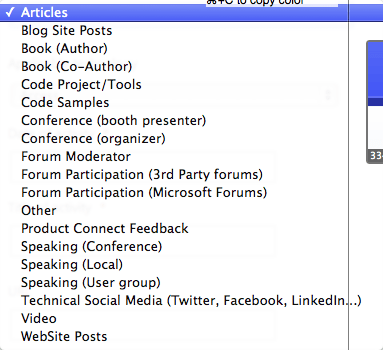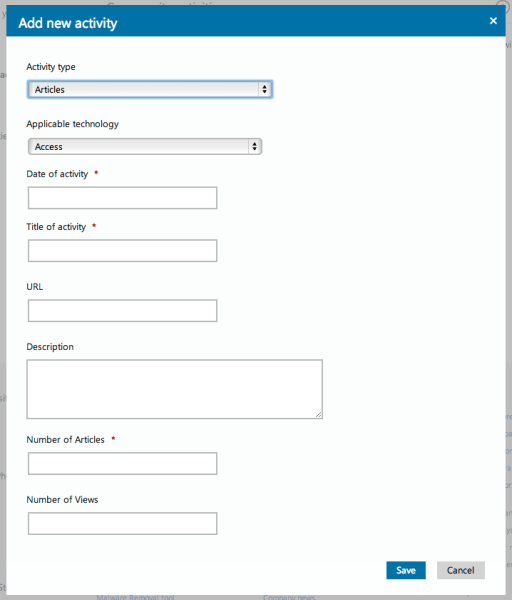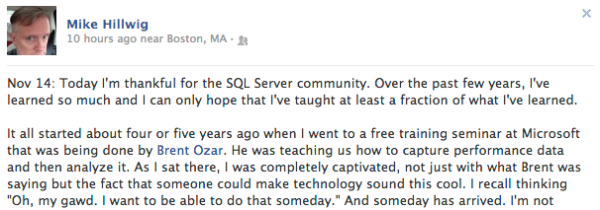The process of becoming a Microsoft MVP is shrouded in mysteries and non-disclosure agreements. Even after you become an MVP, it’s not clear how Microsoft picks who gets the MVP award.
Let’s start with the obvious: the Microsoft MVP nomination form. Anyone can nominate themselves (or others) on that site. The first key is the opening paragraph on the page:
“To become an MVP, it takes truly exceptional, voluntary contributions to Microsoft-related social and technical communities, coupled with outstanding community leadership and a willingness to freely share deep technical knowledge with others.”
Let’s break that paragraph down and analyze it. I’m going to tackle key phrases out of order:
“Microsoft-related social and technical communities” – It doesn’t say online or offline, just any communities. These can be Q&A sites like StackOverflow, SQLServerCentral, or the MSDN Forums. It can also be meatspace communities like local user groups and conferences. With the advent of social media, it can also include YouTube, blogs, Twitter, and Facebook – but the communities need to be Microsoft-related. In the MVP nomination form, here’s the dropdown for activity types – and notice that even coding community tools counts:

“contributions” – You need to be giving back. Reading and consuming doesn’t count.
“voluntary contributions” – Things get a little sketchy here. It doesn’t say you can’t get paid for it – for example, note that book author and co-author are both included in the list, and book authors get paid (although it’s sure as hell not very much). Some company evangelists are paid for their work, and their work includes doing webcasts, publishing content, or speaking at user groups. Those folks might say they’re doing it voluntarily, but you can bet that if they suddenly stopped all community contributions, their checks would stop shortly thereafter.
“outstanding community leadership” – I have no idea what this means. Note that conference organizer and forum moderator are both listed as activity types, but based on MVPs I know, I don’t think this work is actually a prerequisite. Based on the “follower” language in social media, it could mean that “leaders” have a lot of “followers”.
“willingness to freely share” – There’s nothing wrong with charging money for access to your knowledge – a lot of consultants are MVPs. However, you’ve also got to give at least some of it back freely to the public. This has some gray areas too – for example, if you present at a conference, the conference might not actually be free. The PASS Summit makes millions of dollars off attendee entrance fees, as do all major conferences, but based on the activity dropdown, it would appear that PASS presentations still count towards MVP activity.
“share deep technical knowledge” – Let’s be honest – here’s another gray area. I bet you’ve read blogs or seen presentations that you think are completely devoid of “deep technical knowledge.” Remember, though, this might not be the only place where they’re contributing. The takeaway here is that your contributions probably don’t all have to be 400-level.
Now, armed with an understanding of that intro paragraph, the nomination form starts to make more sense. After putting in your name, email address, and country, you have to add a list of your activities. When you read “activity”, think contribution instead:

Activity Type is the dropdown screenshot we showed earlier – blog post, book, code, video, etc.
Applicable Technology is a list of Microsoft products and specialties:

Yes, there’s actually Microsoft Access MVPs.
The rest of the form defines the date of the activity, text about it, and the number of views. I find that last one especially interesting – it’s basically the number of people you helped with your contribution. Did a million people watch your video, or fifteen?
You can add as many activities as you want, and then submit your nomination form.
And that’s the MVP exam.
Note the questions you don’t see:
- The number of Microsoft MCITP exams you’ve passed. many people assume that MVPs are deeply technical in their specialty. Remember that intro paragraph, though – the MVP isn’t about gauging skill levels; it’s about gauging contributions, leadership, and sharing.
- The number of times you’ve dispensed marketing Kool-Aid. I evangelize Microsoft stuff that rocks, and I call it to the carpet when it sucks.
So how are you going to pass that exam? You’re going to make exceptional, voluntary contributions to Microsoft-related social and technical communities by leading and sharing. You’re going to get out there and start giving back, and track where you give back so that you can fill out the MVP nomination form when you believe you’re ready.
And I’ll let you in on another secret: the more that you give back, the less you care about awards. Every year when my MVP award gets renewed, I’m completely surprised and flattered. It’s awesome that Microsoft continues to hand me these little glass disks, but if they stopped tomorrow, I wouldn’t change anything about how I give back. Giving back is its own incredible reward.
Last week, Mike Hillwig posted this on Facebook:

That is what I live for – knowing that I can infect somebody else with the desire to get out there and share what they know in fun, unique ways. If I can do it, you can do it.
Start a blog. Write a presentation. Start a YouTube channel. Answer questions on DBA.StackExchange and StackOverflow. Years from now, when you’re so happy with your newfound passion for sharing what you do, tell me. It keeps me motivated too.


7 Comments. Leave new
The takeaway here: there are Microsoft Word MVPs.
No. The takeaway here is that there are Help (i.e. CHM) MVPs!
[…] How To Pass the Microsoft MVP Exam – Brent Ozar […]
Macintosh MVP!?! Is that the one you have Brent? 😉
Yes you are one of the best sql guru in this world Brent.
Thanks a lot for everything.
A Brent Ozar follower from India.
I think that writing blogs, articles, code samples etc is not enough. I think speaking is a big thing.
As you’ve probably realized by now, you’d be surprised 🙂 Speaking is a big thing, but the year I got my MVP I’d only done 3 speaking gigs. I had however written ~100 blogs a year for several years. That and some work on Stack Exchange and twitter were what did it for me (as best I can tell).